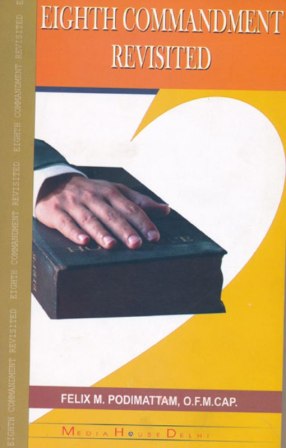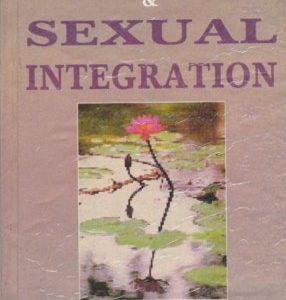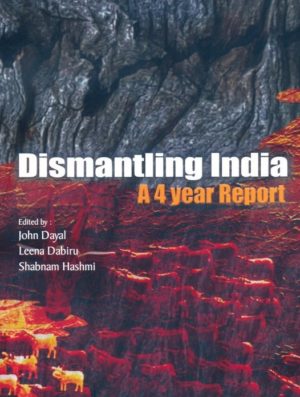Description
EIGHTH COMMANDMENT REVISITED
DrFelix Podimattam is one of the best-known moral theologians in India and outside. Besides his full time job as a professor, he finds time to write books at an amazing rate. He has authored 100 books. Besides his Master’s degree in Political Science from the University of Mysore, he holds a Licentiate in Theology from the Pontifical Gregorian University, Rome, and subsequently a Doctorate in Moral Theology from the Alphosian Academy, Rome, His post-doctoral studies were pursued in Washington, DC, U.S.A. At Present he is professor of moral theology at St. Francis Theological College, Kottayam, Kerala.
Ever since the human race has come into existence the truth has been misinterpreted countlessly. It is very difficult to understand what truth is. Therefor there are conventional methods and means of moral and ethical dimensions that are being followed from the beginning. In fact the eighth commandment helps us to be closer to the truth as it forbids us against the false testimony.
In the book the author has tried to unfold the different aspects of the truth. God being the sublime truth naturally leads to the point that, His creation also is part of the same truth. The freewill that is given to man can comprehend the truth that lies within oneself. From the time immemorial, though those who have witnessed truth have undergone trials and hardships, yet have seen the victory of truth at the end. Convictions that are shaped in the mould of truth will always testify it as it is the underlying factor of every being on this earth.
CONTENTS
INTRODUCTION
CHAPTER ONE
TRUTHFULNESS
1. Theological Basis of Truthfulness
1.1. The Primordial Mystery of Truth in God
1.2. The Divine Witness to the Truth
1.3. Life Flowing from the “Spirit of Truth”
1.4. Bond of Divine Fellowship
1.5. Sanctification in the Truth
2. Bible on Truthfulness
3. Nature of Truthfulness
3.1. Different Levels of Truthfulness
3.2. Truthfulness in Words
3.2.1. Older Understanding of
Truthfulness in Words
3.2.1.1. Description of the Older Understanding
3.2.1.2. Critique of the Older Understanding
3.2.1.2.1. Criticism from Modern Secular Thinkers
3.2.1.2.2. Criticism from Protestant Theologians
3.2.1.2.3. Criticism from Catholic Theologians.
3.2.2. Newer Understanding of Truthfulness in
Words
CHAPTER TWO
THE RETINUE OF TRUTHFULNESS
1. Fidelity
1.1. The Nature of Fidelity and its Presuppositions
1.2. Sacramental Bond of Fidelity
1.3. Fidelity and Trust
1.4. The Promise
2. Respect for Honor and Reputation
2.1. The Moral Good of Honor
2.2. The Principal Duties of Honor.
2.2.1. Duty to Safeguard One’s Own Honor
2.2.2. Duty to Safeguard One’s
Neighbor’s Honor
2.3. Offences against Honor
2.3.1. Offences against the Honor of Self
2.3.2. Offences against the Honor of Others
2.3.2.1. False Suspicion and Rash Judgment.
2.3.2.2. Contumely
2.3.2.3. Detraction.
2.3.2.3.1. The Notion of Detraction
2.3.2.3.2. Morality of Detraction.
2.3.2.3.3. Reasons Justifying the Revelation of Secret Faults..
2.3.2.3.4. Cooperation in Detraction.
2.3.2.3.5. Restitution for Detraction
2.3.2.4. Tile-Bearing
2.3.2.5. Calumny
2.3.2.6. Other Offences.
2.4. Honor in the Shadow of the Cross.
3. Other Accompanying Virtues
3.1. Forbearance.
3.2. Sincerity and Simplicity
3.3. Uprightness.
3.4. Purity 104
chapter three VIOLATION of truthfulness
in expression: the lie
1 Distinction between Lie and Falsehood
2. Lie Can Never Be Justified
3. Falsehood Can Sometimes Be Justified
3.1. Ineffectiveness of the Mechanism of
Mental Reservation
3.2. Weakness of the Basis of Mental Reservation
3.3. Support from Fathers and Medieval Theologians
3.4. Support from the Opinion of Recent Authors
3.5. Support from Rational Arguments
4. Other Forms of Lie
5. Moral Gravity of the Lie
5.1. Serious Moral Gravity of Lie as Such
5.2. The Ordinary Lie as a Slight Fault
5.3. The Lies of Children
5.4. The Pathological Lie
5.5. Forms of Speech that are Not Lies
CHAPTER FOUR
LAWFUL CONCEALMENT OF TRUTH: THE SECRET161 1 • Nature of Secret
1.1. Notion of Secret
1.2. Basis of Secret
1.3. Types of Secret
1.3.1. Natural Secre
1.3.2. Promised Secret
1.3.3. Committed or Entrusted Secret
2. Obligations with Regard to Secret
2.1. Obligations with Regard to Natural Secret
2.1.1. General Principles
2.1.2. Prying and Probing into Secrets




Reviews
There are no reviews yet.